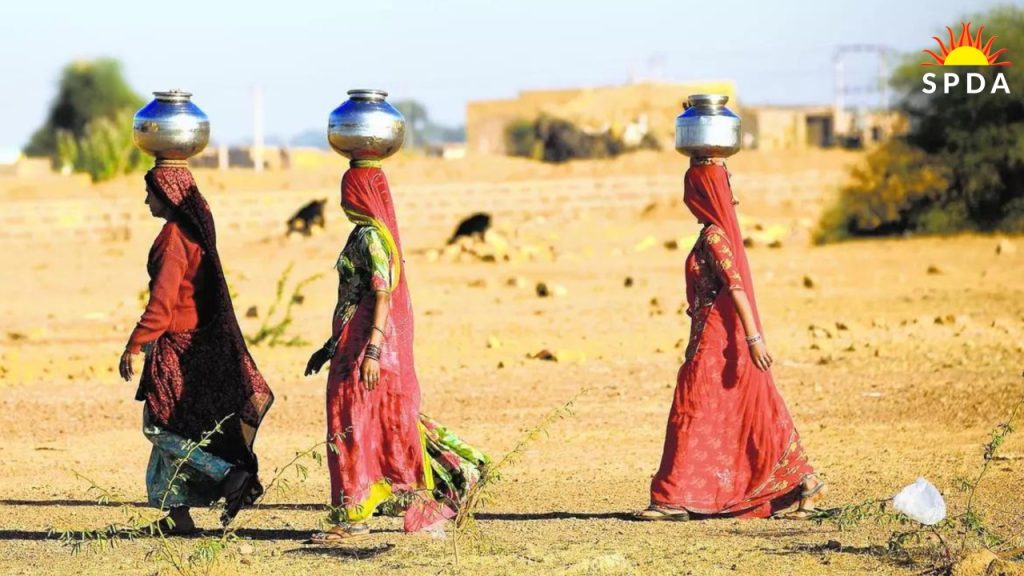
Climate change is an unprecedented global challenge, impacting various aspects of society, from health and livelihoods to the environment. Its consequences are far-reaching, affecting people differently based on their socioeconomic status, gender, and geographic location. As we approach the 28th session of the Conference of the Parties (COP28) to the United Nations Framework Convention on Climate Change, it’s crucial to recognize the gender disparities in climate impacts and champion women’s empowerment as an integral facet of the global climate agenda.
Central to these deliberations is the need to develop a comprehensive understanding of the differential impacts of climate change on various demographic groups particularly the disproportionate impact of climate change on women from marginalized communities, who are more susceptible to health risks and other devastating aspects of climate change.
In this blog, we will focus on how climate change disproportionately affects women, particularly those in marginalized communities, and highlight the pivotal role they play in climate adaptation and mitigation.
Why women are more vulnerable?
Economic Disparities: Women represent 70% of the 1.3 billion people living in poverty. In urban areas, 40% of the poorest households are headed by women. Despite being involved in 50-80% of the world’s food production, women own less than 10% of the land.
Health Issues: 30 peer-reviewed studies also highlighted that around 68% of these studies found women to be more affected by health impacts associated with climate change compared to men. Research shows that women are more affected by health issues associated with climate change compared to men. They are more likely to suffer the consequences of heatwaves and tropical cyclones, leading to a higher incidence of stillbirth and the spread of diseases like malaria, dengue fever, and Zika virus.
Mental Health and Violence: The report highlights that increasing global temperatures are linked to a higher incidence of stillbirth. As temperatures rise due to climate change, the risk of stillbirths also increases, posing a significant challenge to maternal and neonatal health. Rising temperatures contribute to the spread of vector-borne diseases like malaria, dengue fever, and Zika virus. These diseases are particularly concerning for pregnant women, as they are associated with adverse maternal and neonatal outcomes. The expansion of disease-carrying vectors into new regions due to climate change exacerbates these health risks. Women face higher risks of poor mental health as a consequence of extreme weather events.
Displacement and Vulnerability:
Displacement due to climate change disproportionately affects women. It is estimated that approximately 80% of individuals displaced by climate change are women. This displacement exposes them to heightened risks of violence, including sexual violence, as they often lack the protection and resources needed during such crises.
Women worldwide, particularly in lower-income countries, heavily depend on natural resources for their livelihoods. They bear a disproportionate responsibility for securing food, water, and fuel for their families and communities.
Moreover, social norms and childcare responsibilities often prevent women from migrating or seeking refuge in other places when disaster strikes. These constraints hinder their ability to adapt and protect themselves in the face of climate-related challenges.
Women as Agents of Change
Despite the challenges, women play a crucial role in climate change adaptation and mitigation. Their unique experiences can significantly contribute to building climate-resilient communities.
Studies have shown that when women are involved in decision-making at both local and national levels, better climate change adaptation and mitigation outcomes are achieved. A 2019 study revealed that increasing women’s representation in national parliaments led to the adoption of more stringent climate change policies and resulted in lower emissions. Similarly, at the local level, women’s participation in natural resource management has been associated with better resource governance and conservation outcomes. Therefore, addressing gender disparities is not just a matter of justice, but a crucial step towards achieving substantial and sustainable climate action.
The forthcoming COP28 summit presents a unique opportunity to address the gender disparities in climate impacts and to champion women’s empowerment as an integral facet of the global climate agenda. Through a concerted effort to acknowledge and act upon the different ways in which climate change affects men and women, especially those from marginalized communities, we have the potential to forge a more equitable and effective global response to the climate crisis, ensuring a future where justice and sustainability coexist harmoniously.
Women as Catalysts for Climate Action: Harnessing Their Unique Potential
In the battle against climate change, women have emerged as powerful agents of change, despite facing numerous challenges. Their distinctive experiences and perspectives offer valuable contributions to the development of climate-resilient communities. Here’s how women are making a difference:
1. Decision-Making and Leadership:
- Studies have consistently shown that when women are actively involved in decision-making processes, both at local and national levels, climate change adaptation and mitigation efforts are significantly enhanced. Their inclusion brings fresh ideas, perspectives, and a commitment to long-term sustainability.
2. Impact on Climate Policies:
- A compelling example from a 2019 study reveals that increasing women’s representation in national parliaments leads to the adoption of more stringent climate change policies and results in lower greenhouse gas emissions. Women in positions of power are driving forward climate action on a broader scale.
3. Local Resource Management:
- Women’s participation in local natural resource management initiatives has been associated with better resource governance and conservation outcomes. Their hands-on experience often leads to more sustainable and efficient use of resources.
Conclusion
In our shared journey to combat climate change, recognizing the differential impacts it has on men and women, particularly those from marginalized communities, is pivotal. Women, who have proven to be catalysts for climate action, will continue to play a vital role in driving positive change in our collective efforts to address climate change.
COP28 is a platform to address the gender disparities in climate impacts and champion women’s empowerment as an integral component of the global climate agenda. Together, by valuing the unique experiences and contributions of women, we can forge a path towards a more resilient, equitable, and sustainable future.
